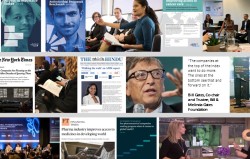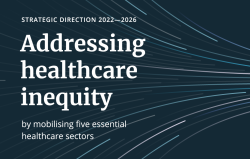How big is the problem?

Equitable access has never been more urgent
Despite recent advances in global health, many medicines and other essential healthcare products remain unaffordable and unavailable for much of the world. Billions of people are unable to access the medicines they need, and basic healthcare services are out of reach for half of the world’s population. This inequity spans treatments for non-communicable diseases as well as interventions to combat infectious diseases, creating an unacceptable gap between the haves and the have-nots.
The people on the frontline of this crisis are the estimated 80% of humanity who live in low- and middle-income countries. With healthcare companies and investors finding more lucrative markets elsewhere, these countries are too often relegated to the back of the queue. But when billions of people living in low- and middle-income countries cannot access essential vaccines and treatments, the consequences are devastating – not just for local populations, but also for global health security, as laid bare by the COVID-19 pandemic.
Closing the healthcare equity gap depends on essential healthcare companies raising their game to ensure better access to medicine worldwide. In many sectors, just a few large firms hold the key to making change happen, whether through their market presence, dominance of manufacturing and distribution or innovative power and intellectual property rights. At the Access to Medicine Foundation, we work tirelessly to mobilise healthcare companies to turn the tide on global healthcare inequity.
We work to transform the healthcare ecosystem
The mission of the Access to Medicine Foundation is to stimulate and guide essential healthcare companies to bring their products to people in low- and middle-income countries. Over the past two decades, we have demonstrated the power of data, collaboration and persuasion to trigger action by the pharmaceutical industry and ensure expanded access to products.
As an independent, non-profit organisation with long-standing industry experience, we are in a unique position to catalyse much-needed change. Our tried-and-tested approach involves defining the actions that healthcare companies should take, analysing what companies are actually doing, and promoting best practices. To turn our insights into action, we engage with the companies we evaluate, as well as with stakeholders across the private and public sectors.
Large-scale change depends on constructive, multistakeholder dialogue. While large pharmaceutical companies have a critical role to play in improving access to medicine, help is needed from many directions – from national governments to the World Health Organization, the United Nations and civil society. We bring a network of powerful allies to the table, including global health organisations, policy-makers in governments and investors.
Our power to make an impact has been proven in the case of R&D-based pharma companies, as demonstrated by the success of the Access to Medicine Index, which is now followed closely in boardrooms around the world. Leveraging this success, in 2022, we expanded our scope to cover a total of five healthcare sectors: R&D-based pharma companies, generic medicine manufacturers, vaccine manufacturers, diagnostics companies and medical gas companies.

